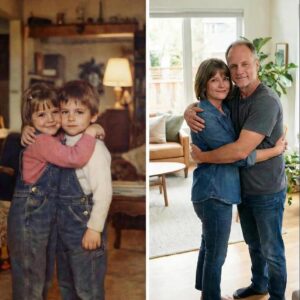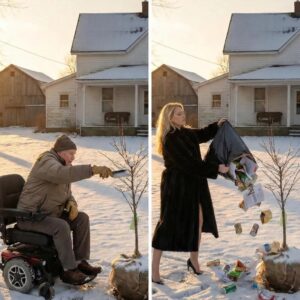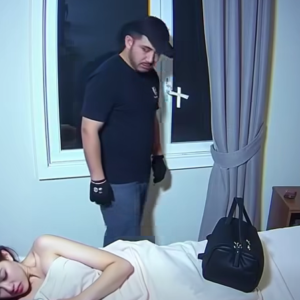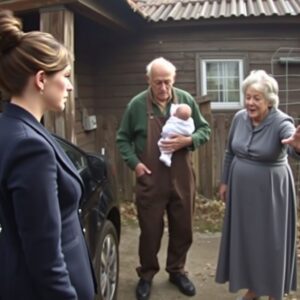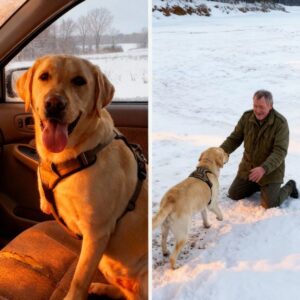Seventeen Missed Calls
When my phone buzzed for the seventeenth time in three days, I didn’t even flinch. The screen lit up with the same contact it always had: Dad.
I didn’t answer. I didn’t listen to the voicemail. I just swiped it away like I’d done with the other sixteen.
It wasn’t spite. Not really. At least, that’s what I told myself. I had reasons. Good ones. Reasons that had stacked up slowly over the years, like unspoken arguments left to rot in silence.
Dad had always been the man with oil on his hands, bugs on his windshield, and wind in his beard. A lifelong member of the Iron Widows motorcycle club, he had a rough sort of charm—one that never quite fit into the glossy, well-organized life I’d built for myself.
His phone calls were unpredictable. Sometimes they came at 2 a.m. after a bar fight or breakdown. Sometimes they were mid-afternoon invitations to “come ride up the coast for a few days.” He never checked if I had work, deadlines, or obligations. It was always his schedule. His road. His rules.
I stopped answering about a year ago.
The last real conversation we’d had ended with me crying in frustration. I’d asked him for a loan—to finish the kitchen remodel in my new condo. He said no. Not cruelly, just… firmly.
“Sweetheart, some things matter more than granite countertops.”
At the time, I’d taken that as judgment. Another sign that he didn’t understand me. That he still saw me as the kid who hated camping and would rather be inside with books than working on a bike with him.
So I stopped calling. And when he called, I stopped picking up.
I told myself that I had a life now. A curated life. A sleek, modern space with white cabinets and quartz counters. Wine tastings, Pinterest boards, and digital photo frames filled with filtered smiles. There wasn’t room in that world for leather jackets that smelled like exhaust or outdated voicemail rants about “the beauty of the open road.”
So when my phone buzzed again—missed call seventeen—I didn’t feel guilty.
I didn’t know he was calling from the side of a highway in 103-degree heat.
I didn’t know he was dying.
I found out the next day.
A voicemail from a stranger. A nurse. No, not a nurse—someone who found him. Someone who saw the name on his emergency contact card and decided to do what I hadn’t: reach out.
“Your father was found beside his motorcycle near Highway 49,” she said. “We’re… we’re so sorry. He passed before help arrived.”
Just like that.
No warning. No buildup. No last words—at least, not ones I had listened to.
I dropped the phone. I couldn’t breathe. I couldn’t speak. I couldn’t even cry—not yet.
All I could think about were those seventeen calls.
And the voicemail I’d deleted without a second thought.
The Letter in the Jacket
The funeral was four days away, but I couldn’t wait that long.
I needed to see the house.
It had been nearly seven years since I’d last been there. Even back then, I’d only stayed long enough to grab a few childhood boxes from the attic and argue with Dad about whether I was “forgetting where I came from.” He always said that like it was a sin.
I told myself the visit now was about logistics—documents, death certificates, cleaning out belongings—but really, I just… needed to know. To feel something. To face the silence.
The driveway still had oil stains. His bike wasn’t there.
The house smelled exactly like I remembered—grease, cedarwood, and the faintest trace of my mother’s old lavender hand cream that seemed to linger eternally in the air.
I didn’t know where to begin. So I went to the garage.
It was always his sanctuary.
The light flickered to life with a buzzing hum. Tools lined the walls like soldiers at attention. Shelves overflowed with spare parts, old helmets, and folded shop towels. I stepped around a bucket of bolts and toward his old leather riding jacket hanging from a hook near the workbench.
It was stiff and sun-faded, the kind of item that felt more like skin than fabric. As I reached into the pocket, I felt something crumpled.
It was a letter.
Addressed to me.
My hands trembled as I pulled it out. The envelope was soft, stained from sweat or rain or both. My name—Emma—was scrawled in his unmistakable handwriting.
I sank to the floor right there between the workbench and the tool chest and opened it.
My darling daughter,
If you’re reading this, I couldn’t wait any longer. I tried to call, sweetheart. Not because I needed something. Because I didn’t want to leave this world without hearing your voice one more time.
The doctors said it spread too far. Not much time left. I didn’t tell you—didn’t want to scare you or make you feel like you had to drop everything.
What I wanted… was one more ride. With you.
To the lake. The one we used to fish at when you were little and you’d fall asleep in the backseat holding your PB&J sandwich and a Barbie doll.
Just one more afternoon. Just quiet. Just us.
The letter trailed off in places. The ink was smudged. But I could hear his voice in every word—softer than I remembered, and full of a love I hadn’t let myself believe still existed.
I pressed the paper to my face and sobbed until the scent of gasoline and memory became indistinguishable from grief.
I had ignored his calls. I had deleted his final words.
But somehow, he had made sure I would still hear them anyway.
His Greatest Ride
The next morning, I found myself still on the floor of the garage, curled up with a fleece blanket I’d pulled from a dusty storage bin in the corner. I hadn’t planned to stay the night, but once I opened that letter, I couldn’t make myself leave.
Sunlight slanted through the garage windows, cutting across stacks of motorcycle magazines and casting long shadows over the cluttered workbench. In the quiet of the morning, everything felt… still. Reverent.
I rose slowly, joints stiff, and wandered into the living room. The same frayed recliner sat where it always had—angled slightly toward the ancient TV he refused to replace even when the color started going. A dent in the carpet where his boots used to rest. A faded ring on the coffee table from his soda cans. The home of a man who lived simply, without ceremony—but not without care.
I don’t know what I expected to find, but what I discovered shook me.
In a cabinet behind the TV, I found three photo albums—bulging, worn, their bindings taped up from years of overuse. I carried them back to the couch and opened the first one, dreading what I might see.
Inside was me.
Photo after photo. From every year of my life.
First day of kindergarten. Me with missing front teeth and glittery fairy wings at Halloween. Middle school plays. Awkward braces. My high school graduation, where I thought he hadn’t shown—but there he was, in the back of the bleachers, barely in frame, grinning like a fool.
I ran my fingers over each plastic sleeve.
He had been there. Watching. Capturing it all. Quietly.
All the years I told myself he didn’t care, that he loved his bike more than he loved me… I had been wrong.
He just didn’t show love the way I wanted him to.
He never had the right words, but he had gestures. Presence. Silent devotion. He didn’t send congratulatory texts or show up in a suit and tie, but he’d always been somewhere in the background. And I hadn’t even noticed.
Later that afternoon, I heard the rumble of engines outside.
I stepped out onto the front porch just as a convoy of motorcycles turned into the gravel driveway.
One after another, the bikes pulled up and parked. They came in leather jackets and denim vests, with worn boots and weathered faces—dozens of them. A brotherhood.
From the lead bike stepped a tall man with salt-and-pepper hair and mirrored sunglasses. He took off his helmet and nodded.
“You Emma?” he asked.
I nodded silently.
He introduced himself as Hawk. Said he and my dad had ridden together for over thirty years.
“We tried calling too,” he said softly. “When he didn’t show up for the Sunday ride, we knew something was wrong. Jack never missed a ride. Ever.”
I swallowed hard. “He called me,” I admitted. “Seventeen times.”
Hawk didn’t flinch. He didn’t judge. Just offered a small, understanding nod.
“He talked about you all the time,” he said. “Always had some story. Showed off your childhood photos like they were rare collectibles. Told every new guy who joined the club that you were his ‘greatest ride.’”
Tears welled in my eyes. “I didn’t know.”
Another biker, a woman in a crimson bandana and grease-stained jeans, stepped forward. “He saved my life,” she said simply. “Took me in when I had nowhere else to go. Gave me work in his shop. Taught me how to fix engines and people.”
More came forward.
A man whose wedding my dad had officiated after their priest backed out. A woman who said he helped her escape an abusive relationship and gave her the down payment for a used truck. A younger guy who told me my dad kept him out of jail by offering him a job and “expecting something better” from him.
One after another, they spoke. Stories that unfolded like hidden chapters of a man I thought I had understood.
He was so much more than I’d let myself see.
And then they brought me to the side of the garage where his pride and joy had been stored—a Harley he’d rebuilt from the frame up, piece by piece, in memory of my mom. They told me he’d taken it on one last ride the day he died. That it had broken down on Highway 49, under that brutal sun, as he tried to make it to the lake.
And when they found him, he was lying beside the bike with the letter still in his pocket.
That night, I found three things in his house that I wasn’t ready for.
The first was a savings account titled “For Emma’s Dreams.” The bank statements were taped to the fridge with a magnet shaped like a spark plug. Over the years, he’d added to it—little by little. Even when I thought he wasn’t helping, he was. Just quietly. On his own terms.
The second was a shoebox filled with every crayon drawing I’d ever made. Cards, construction paper hearts, scribbled apologies from when I’d been a bratty teenager. Every single one saved. Labeled with the date. Some had been laminated, even.
The third was a brand-new leather riding jacket in my size.
Tucked inside was a note, folded in half:
“For when you’re ready to ride. Love you, kid.”
My heart cracked open.
I never was. Not while he lived.
The Last Ride
The day of the funeral arrived with heavy gray skies—not quite raining, but pregnant with it. The kind of sky that mirrors your grief without needing to shout.
The ceremony was scheduled for noon, but the low rumble of engines began much earlier. I looked out the window of Dad’s house at 9 a.m. and saw them pulling in.
First five bikes. Then ten.
By eleven, there were over seventy motorcycles lining the road and lawn.
Men and women of all sizes and stories, wearing denim and leather patched with symbols, names, mottos. All of them here for one reason: him.
Not one came empty-handed. Some brought stories, others brought pieces of him—photos, tokens, handmade things he had gifted them through the years. All of them placed something near the casket before the ceremony began.
A man named Spider—who told me he got the name because of a tattoo he deeply regretted—handed me a small velvet bag before stepping back.

